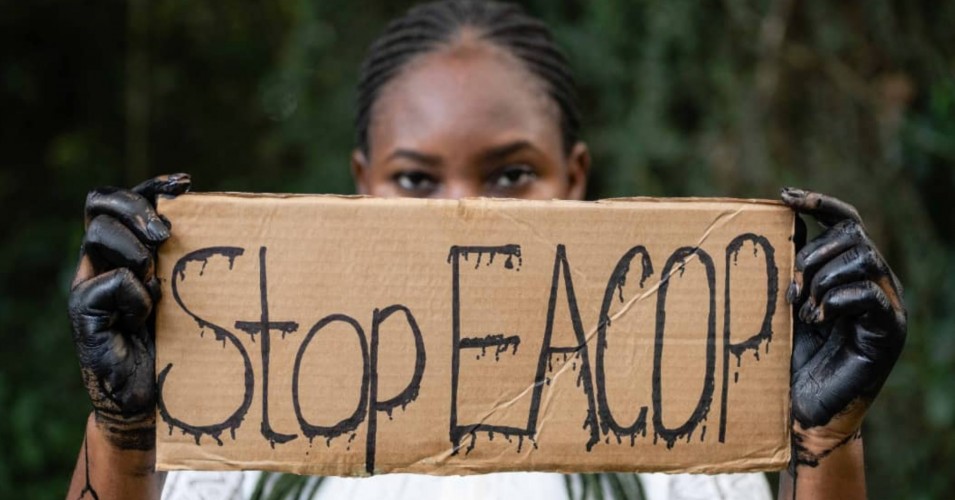
by DGR News Service | Jun 6, 2021 | Biodiversity & Habitat Destruction, Climate Change, Colonialism & Conquest, Culture of Resistance, Direct Action, Mining & Drilling, Movement Building & Support, Repression at Home
Editor’s note: The company has already sold a handful of its onshore oil blocks over the past 10 years, citing the need to cut risk due to community unrest and continued sabotage attacks on its oil installations. These blocks had been snapped up by Nigerian indigenous operators including Seplat Petroleum, Aiteo E&P, First Hydrocarbons and NPDC.
This article originally appeared on Common Dreams.
Featured image: An Ugandan activists holds a sign urging a stop to the East African Crude Oil Pipeline. (Photo: Fridays for Future Uganda/Twitter)
“We cannot drink oil. This is why we cannot accept the construction of the East African Crude Oil Pipeline.”
by Brett Wilkins, Common Dreams staff writer
Climate campaigners in Africa and around the world on Friday continued demonstrations against Total, with activists accusing the French oil giant of ecocide, human rights violations, and greenwashing in connection with fossil fuel projects in Uganda.
On the 145th week of Fridays for Future climate strike protests, members of the movement in Uganda global allies drew attention to the harmful effects of fossil fuel development on the environment, ecosystems, communities, and livelihoods.
Friday’s actions followed protests at Total petrol stations in Benin, the Democratic Republic of Congo, Egypt, Ghana, Kenya, Nigeria, Togo, and Uganda on Tuesday—celebrated each year as Africa Day—against the East African Crude Oil Pipeline (EACOP), now under construction, and the Mozambique Liquefied Natural Gas project.
“Total’s fossil fuel developments pose grave risks to protected environments, water sources, and wetlands in the Great Lakes and East Africa regions,” said Andre Moliro, an activist from the Democratic Republic of the Congo, during Tuesday’s pan-African protests.
“Communities have been raising concerns on the impact of oil extraction on Lake Albert fisheries and the disastrous consequences of an oil spill in Lake Victoria, that would affect millions of people that rely on the two lakes for their livelihoods, watersheds for drinking water, and food production,” he added.
In Uganda, opposing oil development—an expected multi-billion-dollar boon to the landlocked nation’s economy—can be risky business. On Monday, police in Buliisa arrested Ugandan human rights defender Maxwell Atuhura and Italian journalist Federica Marsi.
According to Energy Voice, Atuhura—who works with the African Institute for Energy Governance (AFIEGO), one of half a dozen NGOs that have pursued legal action against Total—and Marsi were about to meet with local community members when they were apprehended.
Marsi was released Monday and reportedly told to leave the oil region “before bad things happen.” She was briefly rearrested later in the day. Atuhura remains in police custody. The World Organization Against Torture has issued an urgent appeal for intervention in his case.
United Nations special rapporteurs and international human rights groups have previously expressed serious concern over abuses perpetrated against land defenders and journalists in Uganda. Despite the risks, actions against EACOP and the related Tilenga Development Project continue.
“We cannot drink oil. This is why we cannot accept the construction of the East African Crude Oil Pipeline,” Ugandan climate justice activist Vanessa Nakate, founder of the Rise Up Movement, said during the Africa Day action. “It is going to cause massive displacement of people [and the] destruction of ecosystems and wildlife habitats.”
“We have no future in extraction of oil because it only means destroying the livelihoods of the people and the planet,” Nakate added. “It is time to choose people above pipelines. It is time to rise up for the people and the planet.”
If completed, the $3.5 billion, nearly 900-mile EACOP will transport up to 230,000 barrels of crude oil per day from fields in the Lake Albert region of western Uganda through the world’s longest electrically heated pipeline to the Tanzanian port city of Tanga on the Indian Ocean.
In partnership with China National Offshore Oil Corporation (CNOOC) and the Uganda National Oil Company (UNOC), Total is also leading the Tilenga Development Project, which involves the drilling of 400 wells in dozens of locations, including iniside the richly biodiverse Murchison Falls National Park.
Total says the project will “generate a positive net impact on biodiversity,” a claim vehemently rejected by environmentalists.
“Imagine a tropical version of the Alaskan oil pipeline,” environmental author Fred Pearce wrote of EACOP last year. “Only longer. And passing through critical elephant, lion, and chimpanzee habitats and 12 forest reserves, skirting Africa’s largest lake, and crossing more than 200 rivers and thousands of farms before reaching the Indian Ocean—where its version of the Exxon Valdez disaster would pour crude oil into some of Africa’s most biodiverse mangroves and coral reefs.”
Although Total claims it chose the EACOP route to “minimize the number of residents relocated,” local residents and international NGOs say the pipeline’s impact will be anything but minimal.
According to Mongabay, more than 12,000 families will be displaced from their ancestral lands to make way for the pipeline, two-thirds of which will pass through agricultural zones. Farmers in the pipeline’s path and the Lake Albert oil region have joined civil society groups and international organizations in voicing their opposition to the EACOP and Tilenga projects.
The #StopEACOP coalition, which is made up of local and international activists and organizations, is attempting to block funding of the project by appealing to banks, investors, and insurance companies. A March open letter signed by more than 250 groups urged 25 commercial banks to not finance the pipeline.
In 2017, WWF Uganda published a report warning that the pipeline “is likely to lead to significant disturbance, fragmentation, and increased poaching within important biodiversity and natural habitats” that are home to species including chimpanzees, elephants, and lions.
Wildlife forced from natural habitats by oil development has in turn caused severe disruptions to farming families.
“We have always had a problem of human-wildlife conflict in this village, but with drilling and road construction across the park, the invasions are more frequent,” Elly Munguryeki, a farmer living just outside Murchison Falls National Park, told South Africa’s Mail & Guardian earlier this month.
“We keep reporting the losses to park authorities but nothing happens,” said Munguryeki. “Each night a herd of buffalo, baboons, and hippos from the park would invade my farm and neighbouring plots and eat our crops until dawn. Whatever they left would be eaten by baboons and wild pigs during the day, forcing us to harvest premature crops.”
A 2020 Oxfam report (pdf) noted the EACOP “will cross poor, rural communities in both Uganda and Tanzania that lack the political and financial capital of the project stakeholders.”
“The lopsided complications of this power dynamic are well-documented in similar extractive industry projects,” the report stated. “Powerful companies are often able to hide their operations behind local contractors and permissive government authorities. Often the only hope that local communities have for remediation or justice is through local government bodies that are often weak, fragile, or captured by corporate and national interests.”
Mary, an Ugandan farmer in Rakai near the Tanzanian border who was interviewed for the report, said that “when this pipeline project came, they promised us too many things. Up to now they have done nothing.”
“What makes me worried is that they took my land but I have not yet been compensated,” she claimed.
A community member from Rujunju village, Kikuube District in Uganda told the report’s authors that “the government and oil companies have not informed us about the negative impact that the EACOP will have on our well-being. All they tell us are good things that the EACOP will bring like roads and jobs. We also want to know the negative impact of the pipeline so that we can make informed decisions.”
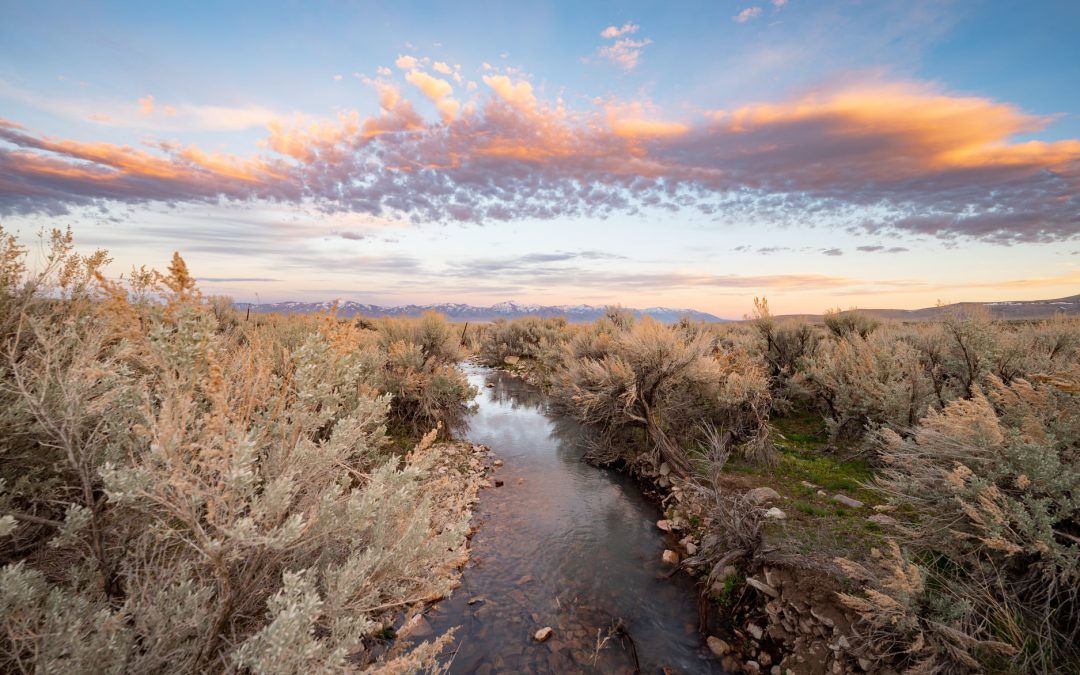
by DGR News Service | Apr 21, 2023 | ANALYSIS, Biodiversity & Habitat Destruction, Climate Change, Mining & Drilling
Editor’s Note: Mainstream environmental organizations propose electric vehicles (EVs) as a solution to every environmental crisis. It is not only untrue, but a delusion. It does not matter to the hundreds of lives lost whether they were killed for extraction of fossil fuel for traditional internal combustion (IC) cars, or for extraction of materials necessary for manufacturing EVs. What matters is that they are dead, never to come back, and that they died so a portion of humans could have convenient mobility. DGR is organizing to oppose car culture: both IC and EVs.
By Benja Weller
I am a rich white man in the richest time, in one of the richest countries in the world (…)
Equality does not exist. You yourself are the only thing that is taken into account.
If people realized that, we’d all have a lot more fun.
ZDF series Exit, 2022, financial manager in Oslo,
who illegally traded in salmon
Wir fahr’n fahr’n fahr’n auf der Autobahn
Vor uns liegt ein weites Tal
Die Sonne scheint mit Glitzerstrahl
(We drive drive drive on the highway
Ahead of us lies a wide valley
The sun shines with a glittering beam)
Kraftwerk, Single Autobahn / Morgenspaziergang, 1974
Driving a car is a convenient thing, especially if you live in the countryside. For the first time in my life I drive a car regularly, after 27 years of being “carless”, since it was left to me as a passenger. It’s a small Suzuki Celerio, which I call Celery, and fortunately it doesn’t consume much. Nevertheless, I feel guilty because I know how disturbing the engine noise and exhaust fumes are for all living creatures when I press the gas pedal.
So far, I have managed well by train, bus and bicycle and have saved a lot of money. As a photographer, I used to take the train, then a taxi to my final destination in the village and got to my appointments on time. Today, setting off spontaneously and driving into the unknown feels luxurious.
However, my new sense of freedom is in stark contrast to my understanding of an intact environment: clean air, pedestrians and bicyclists are our role models, children can play safely outside. A naive utopia? According to the advertising images of the car industry, it seems as if electric cars are the long-awaited solution: A meadow with wind turbines painted on an electric car makes you think everything will be fine.

“Naturally by it’s very nature.” says the writing on an EV of the German Post, Neunkirchen, Siegerland (Photo by Benja Weller)
In Germany, the car culture (or rather the car cult) rules over our lives so much that not even a speed limit on highways can be achieved. The car industry has been receiving subsidies from the government for decades and journalists are ridiculed when they write about subsidies for cargo bikes.
Right now, this industry is getting a green makeover: quiet electric cars that don’t emit bad air and are “CO2 neutral” are supposed to drive us and subsequent generations into an environmentally friendly, economically strong future. On Feb. 15, 2023, the green party Die Grünen published in its blog that the European Union will phase out the internal combustion engine by 2035: “With the approval of the EU Parliament on Feb. 14, 2023, the transformation of the European automotive industry will receive a reliable framework. All major car manufacturers are already firmly committed to a future with battery-electric drives. The industry now has legal and planning certainty for further investment decisions, for example in setting up its own battery production. The drive turnaround toward climate-friendly vehicles will create future-proof jobs in Europe.”
That’s good news – of course for the automotive industry. All the old cars that will be replaced with new ones by 2035 will bring in more profit than old cars that will be driven until they expire. That the EU along with the car producers, are becoming environmentalists out of the blue is hard to believe, especially when you see what cars drive on German roads.
In recent years, a rather opulent trend became apparent: cars with combustion engines became huge in size and gasoline consumption increased, all in times of ecological collapse and global warming. These oversized SUVs are actually called sport-utility vehicles, even if you only drive them to get beer at the gas station. Small electric cars seem comfortable enough and have a better environmental footprint than larger SUVs. But the automotive industry is not going to let the new electromobility business go to waste that easily and is offering expensive electric SUVs: The Mercedes EQB 350 4matic, for example, which weighs 2.175 tons and has a 291-hp engine, costs €59,000 without deducting the e-car premium.

Comparing the Citroen 2CV and the Renault Zoe electric car shows that the Zoe uses about 8 times more kinetic energy. (Graph by Frederic Moreau)
If we look at all the production phases of a car and not just classify it according to its CO2 emmissions, the negative impact of the degradation of all the raw materials needed to build the car becomes visible. This is illustrated by the concept of ecological backpack, invented by Friedrich Schmidt-Bleek, former head of the Material Flows and Structural Change Department at the Wuppertal Institute for Climate, Environment and Energy. On the Wuppertal Institute’s website, one can read that “for driving a car, not only the car itself and the gasoline consumption are counted, but also proportionally, for example, the iron ore mine, the steel mill and the road network.”
“In general, mining, the processing of ores and their transport are among the causes of the most serious regional environmental problems. Each ton of metal carries an ecological backpack of many tons, which are mined as ore, contaminated and consumed as process water, and weigh in as material turnover of the various means of transport,” the Klett-Verlag points out.
Car production requires large quantities of steel, rubber, plastic, glass and rare earths. Roads and infrastructure suitable for cars and trucks must be built from concrete, metal and tar. Electric cars, even if they do not emit CO2 from the exhaust, are no exception. Added to this is the battery, for which electricity is needed that is generated at great material expense, a never-ending cycle of raw material extraction, raw material consumption and waste production.
Power generation sources for electric vehicles (Graph by Frederic Moreau)
Lithium is a component of batteries needed for electric cars. For the production of these batteries and electric motors, raw materials are used “that are in any case finite, in many cases already available today with limited reserves, and whose extraction is very often associated with environmental destruction, child labor and overexploitation,” as Winfried Wolf writes in his book Mit dem Elektroauto in die Sackgasse, Warum E-Mobilität den Klimawandel beschleunigt (With the electric vehicle into the impasse, why e-mobility hastens climate change).
What happens behind the scenes of electric mobility, which is touted as “green,” can be seen in the U.S. campaign Protect Thacker Pass. In northern Nevada, a state in the western U.S., resistance is stirring against the construction of an open-pit mine by the Canadian company Lithium Americas, where lithium is to be mined. Here, a small group of activists, indigenous peoples and local residents have united to raise awareness of the destructive effects of lithium mining for electric car batteries and to prevent the lithium mine in the long term with the Protect Thacker Pass campaign.
Thacker Pass is a desert area (also called Peehee muh’huh in the native language of the Northern Paiute) that was originally home to the indigenous peoples of the Northern Paiute, Western Shoshone, and Winnemuca Tribes. The barren landscape is still home to some 300 species of animals and plants, including the endangered Kings River pyrg freshwater snail, jack rabbit, coyote, bighorn sheep, golden eagle, sage grouse, and pronghorn, and is home to large areas of sage brush on which the sage grouse feeds 70-75% of the time, and the endangered Crosby’s buckwheat.
For Lithium Americas, Thacker Pass is “one of the largest known lithium resources in the United States.” The Open-pit mining would break ground on a cultural memorial commemorating two massacres perpetrated against indigenous peoples in the 19th century and before. Evidence of a rich historical heritage is brought there by adjacent caves with burial sites, finds of obsidian processing, and 15,000-year-old petroglyphs. For generations, this site has been used by the Northern Paiute and Western Shoshone tribes for ceremonies, traditional gathering and hunting, and educating young Native people. Now it appears that the history of the colonization of Thacker Pass is repeating itself.
According to research by environmental activists, the lithium mine would lower the water table by 10 meters in one of the driest areas in the U.S., as it is expected to use 6.4 billion gallons of water per year for the next 40 years. This would be certain death for the Kings River pyrg freshwater snail. Mining one ton of lithium generally consumes 1.9 million liters of water at a time when there is a global water shortage.
The mine would discharge uranium, antimony, sulfuric acid and other hazardous substances into the groundwater. This would be a major threat to animal and plant species and also to the local population. Their CO2 emissions would come up to more than 150,000 tons per year, about 2.3 tons of CO2 for every ton of lithium produced. So much for CO2-neutral production! Thanks to a multi-billion dollar advertising industry, mining projects are promoted as sustainable with clever phrases like “clean energy” and “green technology”.
About half of the local indigenous inhabitants are against the lithium mine. The other half are in favor of the project, hoping for a way out of financial hardship through better job opportunities. Lithium Americas’ announcement that it will bring an economic boost to the region sounds promising when you look at the job market there. But there’s no guarantee that working conditions will be fair and jobs will be payed well. According to Derrick Jensen, jobs in the mining industry are highly exploitative and comparable to conditions in slavery.
Oro Verde, The Tropical Forest Foundation, explains: “With the arrival of mining activities, local social structures are also changing: medium-term social consequences include alcohol and drug problems in the mining regions, rape and prostitution, as well as school dropouts and a shift in career choices among the younger generation. Traditional professions or (subsistence) agriculture are no longer of interest to young people. Young men in particular smell big money in the mines, so school dropouts near mines are also very common.”
Seemingly paradoxically, modern industrial culture promotes a rural exodus, which in turn serves as an argument for the construction of mines that harm the environment and people. Indigenous peoples have known for millennia how to be locally self-sufficient and feed their families independently of food imports. This autonomy is being repeatedly snatched away from them.
Erik Molvar, wildlife biologist and chair of the Western Watersheds Project, says of the negative impacts of lithium mining in Thacker Pass that “We have a responsibility as a society to avoid wreaking ecological havoc as we transition to renewable technologies. If we exacerbate the biodiversity crisis in a sloppy rush to solve the climate crisis, we risk turning the Earth into a barren, lifeless ball that can no longer sustain our own species, let alone the complex and delicate web of other plants and animals with which we share this planet.”
We share this planet with nonhuman animal athletes: The jack rabbit has a size of about 50cm (1.6 feet), can reach a speed of up to 60 km/h (37mph) and jump up to six meters (19.7 feet) high from a standing position. In the home of the jack rabbit, 25% of the world’s lithium deposits are about to be mined. To produce one ton of lithium, between 110 and 500 tons of earth have to be moved per day. Since lithium is only present in the clay rock in a proportion of 0.2-0.9%, it is dissolved out of the clay rock with the help of sulfuric acid.
According to the Environmental Impact Statement from the Thacker Pass Mine (EIS), approximately 75 trucks are expected to transport the required sulfur each day to convert it to sulfuric acid in a production facility built on site. This means that 5800 tons of sulfuric acid would be left as toxic waste per day. Sulfur is a waste product of the oil industry. How convenient, then, that the oil industry can simply continue to do “business as usual.”
Nevada Lithium, another company that operates lithium mines in Nevada states: “Electric vehicles (EVs) are here. The production of lithium for the batteries they use is one of the newest and most important industries in the world. China currently dominates the market, and the rest of the world, including the U.S., is now responding to secure its lithium supply.” The demand for lithium is causing its prices to skyrocket: Since the demand for lithium for the new technologies is high and the profit margin is 46% according to Spiegel, every land available will be used to mine lithium.
Lithium production worldwide would have to increase by 400% to meet the growing demand. With this insane growth rate as a goal, Lithium Americas has begun initial construction at Thacker Pass on March 02, 2023. But environmentalists are not giving up, they are holding meetings, educating people about the destructive effects of lithium mining, and taking legal action against the construction of the mine.
Let’s take a look at the production of German electric cars.
Meanwhile, this is the third attempt to bring electric cars to the market in Germany. In the early 20th century, Henry Ford’s internal combustion engine cars replaced electric-powered cars on the roads.

Graph by Frederic Moreau
“In fact, three decades ago, there were similar debates about the electric car as today. In 1991, various models of electric vehicles were produced in Germany and Switzerland,” writes Winfried Wolf. “At that time, it was firmly assumed that the leading car companies would enter into the construction of electric cars on a large scale.”
He goes on to write about a four-year test on the island of Rügen that tested 60 electric cars, including models by VW, Opel, BMW and Daimler-Benz passenger cars from 1992 to 1996. The cost was 60 million Deutsche Mark. The Institute for Energy and Environmental Research (IFEU) in Heidelberg, commissioned by the Federal Ministry of Research, concluded that electric cars consume between 50 percent (frequent drivers) and 400 percent more primary energy per kilometer than comparable cars with internal combustion engines. The test report states that the Federal Environment Agency (UBA) in Berlin also sees its rejection of the electric car strategy confirmed.
There is no talk of these test results in times of our current economic crisis: also German landscapes and its water bodies must make way for a “green” economic policy. We can see the destructive effects of electric car production centers in the example of Grünheide, a town in Brandenburg 30 km from Berlin.
Manu Hoyer, together with other environmentalists in the Grünheide Citizens’ Initiative, rebel against the man who wants to discover life on other planets because the Earth is not enough: Elon Musk. She explains in an article by Frank Brunner in the magazine Natur how Tesla proceeded to build the Gigafactory Berlin-Brandenburg with supposedly 12,000 employees: First, they deforested before there was even a permit, and when it was clear that the electric car factory would be built, Tesla planted new little trees elsewhere as compensation.
The neutral word “deforestation” does not explain the cruel process behind it: Wildlife have their habitat in trees, shrubs and in burrows deep in the earth. In the Natur article, Manu Hoyer recalls that the sky darkened “with ravens waiting to devour the dead animals among the felled trees.”
In the book The Day the World Stops Shopping, J.B. MacKinnon describes, based on a study of clearing in Australia, that the scientific consensus is that the majority, and in some cases all, of the individuals living at a site will die when the vegetation disappears.
It doesn’t sound pretty, but it’s the reality when you read that animals are “crushed, impaled, mauled or buried alive, among other things. They suffer internal bleeding, broken bones or flee into the street where they are run over.” Many would stubbornly resist giving up their habitat.
In this, they are like humans. Nobody gives up her piece of land or his house without a fight when it is taken away from him; animals and humans both love the good life. But the conditions of wild animals play no role in our civil society, they should be available anytime to be exlpoited for our needs.
In order not to incite nature lovers, legal regulations are supposed to lull them into the belief that what is happening here is morally right. Behind this is a calculus by the large corporations, which in return for symbolic gestures can continue the terror against nature blamelessly.
In December 2022, Tesla was granted permission to buy another 100 hectares of forest to expand the car factory site to 400 hectares. The entire site had long been available for new industrial projects, although it is also a drinking water protection area. The Gigafactory uses 1.4 million cubic meters of water annually in a federate state plagued by drought.
Manu Hoyer tells Deutschlandfunk radio that dangerous chemicals are said to have leaked only recently and contaminated firefighting water seeped into the groundwater during a fire last fall. Another environmentalist, Steffen Schorcht, who studied biocybernetics and medical technology, criticizes local politicians for their lethargy in the face of environmental destruction. He sees no other way to fight back than to join forces with other citizens and international organizations outside of politics.
The beneficiaries are not the people who make up the bulk of the population. Tesla cars go to drivers who are happy to spend 57,000€ for a car with a maximum of 535 horsepower.
I can still remember how, as a child, I used to drive with my parents on vacation to the south of France, Italy or Austria in the Citroën 2CV model (two horsepower). Such a car trip was more adventure than luxury, but the experiences during the simple camping vacations in Europe’s nature have remained formative childhood memories.
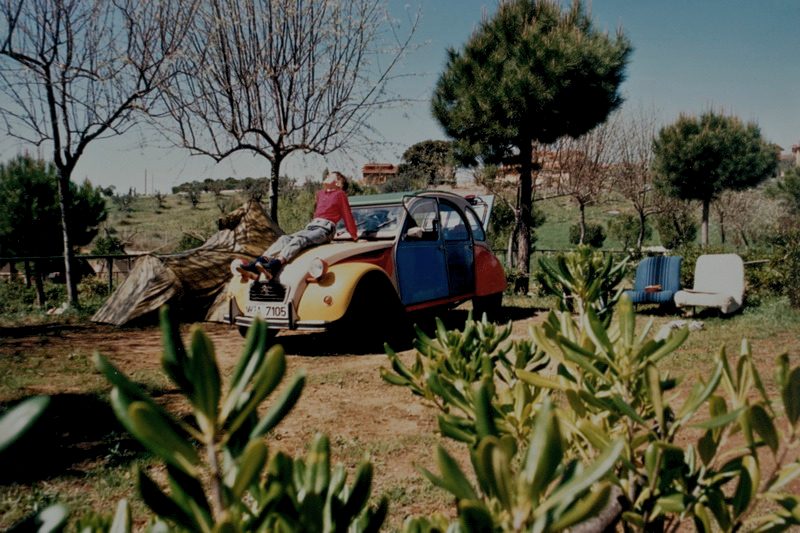
The author sitting on the hood of a Citroën 2CV in Tuscany, Italy, 1989 (Photo: private)
Today, we have to go a big step further than just living a “simple life” individually. The car industry is pressing the gas pedal, taking the steering wheel out of our hands and driving us into the ditch. It’s time to get out, move our feet and stand up against the car industry.
The BDI, Federation of German Industries, writes in its 2017 position paper on the interlocking of raw materials and trade policy in relation to the technologies of the future that without raw materials there would be no digitalization, no Industry 4.0 and no electromobility. This statement confirms that our western lifestyle can only be financed through the destruction of the last natural habitats on Earth.
The mining of lithium and other so-called “raw materials” for new technologies is related to our culture, which imposes a techno-dystopia on the functioning organism Earth, that nullifies all biological facts. If we want to save the world, it seems to me, we should not become lobbyists for the electric car industry. Rather, we should organize collectively, learn from indigenous peoples, defend the water, the air, the soil, the plants, the wildlife, and everyone we love. The brave environmentalists in Grünheide and Thacker Pass are showing us how.
Homo sapiens have done well without cars for 200,000 years and will continue to do so. All we need is the confidence that our feet will carry us.
Wir fahr’n fahr’n fahr’n auf der Autobahn, Kraftwerk buzzed at the time
as an ode to driving a car
I glide over the asphalt to the points in lonely nature,
give myself a time-out from the confines of the small town
Bus schedules in German villages are an old joke
Buy me a Mercedes Benz, cried Janis Joplin devotedly,
without an expensive car, life is only half as valuable
Car-free Sundays during the oil crisis as a nostalgic anecdote
Driving means freedom and compulsion at the same time, asphalt is forced upon topsoil
with millions of living beings per tablespoon of earth
You must go everywhere: To the supermarket, to school, to work, to the store,
to the club, to friends, and to the trail park
Be yourself! they tell you, but without a car you’re not yourself,
on foot with a lower social status than on wheels
The speed limit dismissed each time, which party stands for the wild nature,
our ancient living room? Don’t vote for them, they deceive too
Believe yourself! they say, but what else can you believe, grown up believing
that this civilization is the only right one
Drive, drive, drive and the airstream flies in your hair –
Freedom, the one moment you have left
Featured image: A view of Thacker Pass by Max Wilbert
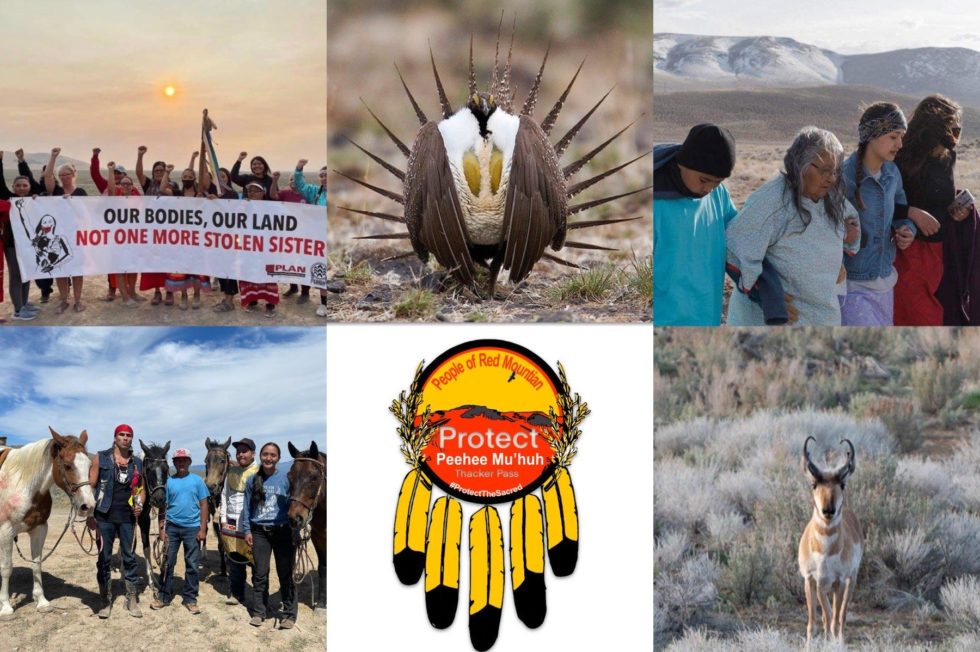
by DGR News Service | Feb 25, 2023 | ANALYSIS, Biodiversity & Habitat Destruction, Colonialism & Conquest, Indigenous Autonomy, Mining & Drilling
Editor’s note: The Thacker Pass lithium mine project reflects more than one injustices in the world: greenwashing mines, denying U.S. atrocities against indigenous tribes, grabbing indigenous land against their will, ecocide. This article highlights some of these injustices.
By Brett Wilkins / Common Dreams
A coalition of conservation groups on Tuesday joined Native American tribes in launching legal challenges to a proposed lithium mine in northern Nevada that critics say was “illegally approved” and will “irreparably damage” the delicate desert ecosystem and land where Indigenous peoples are seeking federal historical recognition of a genocidal massacre perpetrated by U.S. colonizers.
Members of the Western Watersheds Project filed an emergency motion in federal court Tuesday seeking an injunction against the Thacker Pass Lithium Mine in Humboldt County pending action by the 9th U.S. Circuit Court of Appeals to ensure the project—which would tap into the largest known source of lithium in the United States and was approved during the final days of the Trump administration—complies with federal law.
“This mine should not be allowed to destroy public land unless and until the 9th Circuit has determined whether it was legally approved,” Western Watersheds Project staff attorney Talasi Brooks said in a statement announcing the filing.
“There’s no evidence that Lithium Nevada will be able to establish valid mining claims to lands it plans to bury in waste rock and tailings, but the damage will be done regardless,” Brooks added, referring to the subsidiary of Canada-based Lithium Americas that is seeking to build the mine. Lithium is a key component of electric vehicle batteries, cellphones, and laptops.
The emergency motion follows a lawsuit filed last week by the Reno-Sparks Indian Colony, Burns Paiute Tribe, and Summit Lake Paiute Tribe in response to U.S. District Judge Miranda Du’s earlier ruling that largely favored Lithium Americas and rejected opponents’ claims that the project would cause “unnecessary and undue degradation” to the environment and wildlife.
“When the decision was made public on the previous lawsuit last week, we said we would continue to advocate for our sacred site PeeHee Mu’Huh. A place where prior to colonization, all our Paiute and Shoshone ancestors lived for countless generations,” Arlan Melendez, chairman of the Reno-Sparks Indian Colony, said in a statement.
“It’s a place where all Paiute and Shoshone people continue to pray, gather medicines and food, honor our nonhuman relatives, honor our water, honor our way of life, honor our ancestors,” Melendez added.
All three tribes call Thacker Pass PeeHee Mu’Huh, which means “rotten moon”—a name given to honor the dozens and perhaps scores of Northern Paiute men, women, and children who were massacred by Nevada Cavalry on September 12, 1865.
According to an account by one participant:
Daylight was just breaking when we came in sight of the Indian camp. All were asleep. We unslung our carbines, loosened our six-shooters, and started into that camp of savages at a gallop, shooting through their wickiups as we came. In a second, sleepy-eyed squaws and bucks and little children were darting about, dazed with the sudden onslaught, but they were shot before they came to their waking senses…
We dismounted to make a closer examination. In one wickiup we found two little papooses still alive. One soldier said, “Make a cleanup. Nits make lice.”
The three tribes assert that all of Thacker Pass should be listed on the National Register of Historic Places.
“While Americans tend to focus on only the proud moments of American history, the shameful history of genocide perpetrated by the American government against Native Americas is nevertheless a broad pattern running throughout American history,” Michon Eben, the Reno-Sparks Indian Colony’s cultural resource manager, wrote in a 2022 letter to the U.S. Bureau of Land Management (BLM).
Eben added that the tribe “considers the destruction of its traditional cultural properties for another mine another act of genocide in the broad pattern running throughout American history.”
Indigenous advocates argue that victims of the 1865 massacre were never properly buried, that human remains and artifacts are still being discovered in Thacker Pass, and that federal authorities failed to properly consult tribes on the mine project in violation of the National Historic Preservation Act.
“Part of the federal government’s responsibility is to determine if a proposed mining project may adversely affect historic properties. Historic properties include Native American massacre sites,” Eben told Nevada Current. “The BLM failed in its trust responsibility to tribes and now our ancestors’ final resting place is currently being destroyed at PeeHee Mu’huh.”
“The BLM failed in its trust responsibility to tribes and now our ancestors’ final resting place is currently being destroyed.”
Will Falk, attorney for the Reno-Sparks Indian Colony and co-founder of Protect Thacker Pass—which set up a protest camp on the site of the proposed mine—accused BLM officials of lying about the massacre site being located outside the project area.
“The Biden administration and [Interior] Secretary Deb Haaland keep paying lip service to tribal rights and respect for Native Americans,” Falk told Last Real Indians last year. “Well, now three federally recognized tribes are saying that BLM Winnemucca did not respect tribal rights. It’s time that BLM halts this project so the tribes can be heard.”
Tim Crowley, vice president of government affairs and community relations for Lithium Nevada, argued in a statement that “since we began this project more than a decade ago, we have been committed to doing things right,” and that Du’s ruling “definitively supported the BLM’s consultation process, and we are confident the ruling will be upheld.”
While global demand for lithium is surging, extraction of the metal can have devastating consequences, including destruction of lands and ecosystems and water contamination.
“Global warming is a serious problem and we cannot continue burning fossil fuels, but destroying mountains for lithium is just as bad as destroying mountains for coal,” contends Max Wilbert of Protect Thacker Pass. “You can’t blow up a mountain and call it green.”
Please donate to support the case and fund legal costs!
DONATE: https://www.protectthackerpass.org/donations-and-funding/
![Legal update and hearing this week / Press Conference on Thacker Pass Lawsuits [Dispatches from Thacker Pass]](https://dgrnewsservice.org/wp-content/uploads/sites/18/2021/08/Rally-at-Far-Western-980x549-1.jpg)
by DGR News Service | Aug 27, 2021 | Biodiversity & Habitat Destruction, Climate Change, Colonialism & Conquest, Indigenous Autonomy, Listening to the Land, Mining & Drilling, Movement Building & Support, Obstruction & Occupation, Repression at Home, Toxification
On Friday, August 27th at 2pm Pacific, attorneys for Reno-Sparks Indian Colony and Atsa Koodakuh wyh Nuwu (People of Red Mountain) will hold a virtual press conference updating supporters and media members on the lawsuits against the Bureau of Land Management and Lithium Nevada Corporation.
Earlier that morning, there will be a hearing in Federal District Court. Judge Miranda Du will hear arguments from Reno-Sparks Indian Colony and Atsa Koodakuh wyh Nuwu (People of Red Mountain) on their motion for a preliminary injunction. If Judge Du grants the injunction, she is recognizing that these plaintiffs have a good chance of succeeding in their lawsuit which argues that the Bureau of Land Management violated federal law when they permitted the Thacker Pass lithium mine by not properly consulting with tribes. The full lawsuit will be heard later in 2021 or early 2022.
Friday’s hearing will be open to the public via video conference, but not in-person. We encourage anyone who is interested to attend. **But legal hearings can be hard to understand if you are not a lawyer, which is why we are planning to hold this virtual press conference that afternoon to explain what is happening in the case.**
Questions will be accepted and members of the press are invited to join.
The press conference will be live streaming on the Protect Thacker Pass Facebook page.
Legal update and hearing this week
Media coverage regarding the July 21st Thacker Pass mine-related injunction hearing seems to misunderstand the current status and implications of the ongoing legal battles over Thacker Pass, or “Peehee Mu’huh.”
Contrary to these media misrepresentations, Thacker Pass’ fate has not yet been decided – far from it. Lithium Nevada still has formidable legal obstacles to overcome – including the recent addition of Paiute-Shoshone plaintiffs bearing new, stronger arguments against the excavation of cultural sites at Thacker Pass.
It’s true that on July 23rd, Nevada Federal District Court Judge Miranda Du refused to grant an injunction that would have prohibited, on environmental grounds, the archaeological excavation of cultural sites at Thacker Pass. The judge rejected claims that the preliminary archaeological digging (of numerous hand-dug holes and seven 40-meter trenches) would cause irreparable environmental harm to the area.
However, some of the recent media coverage fails to clarify two crucial points. First, the July 23rd decision pertains only to the request for a preliminary injunction, rather than to the underlying legal case itself. Second, and even more importantly, on July 19th new plaintiffs moved to intervene in the legal case.
What is a Preliminary Injunction?
A preliminary injunction is a court order that preserves the status quo between relevant parties while the judge makes larger decisions about the underlying case. Since American law assumes that money can repair all harm, the legal system often allows companies to continue their projects even during an active lawsuit. If the judge rules that the company (or the BLM) violated the law, these defendants can compensate the harmed party with money. However, many judges recognize that money is not always an adequate reparation for harm to the environment or to cultural resources. Therefore, in such cases, judges often entertain a preliminary injunction motion.
Why did Judge Du reject the first preliminary injunction request?
In considering the environmental groups’ motion for a preliminary injunction, Judge Du acknowledged the possibility that the initial, archaeological excavations mentioned above could cause irreparable environmental harm. Although the judge ultimately decided that the smaller archaeological excavations would not cause that level of disturbance, she has not yet ruled on the environmental threat posed by the entire project.
What comes next for the environmental lawsuit?
The underlying legal case (filed back in February by Western Watersheds Project, Wildlands Defense, Great Basin Resource Watch, and Basin and Range Watch), challenges the Bureau of Land Management’s Record of Decision, which permitted the corporation’s proposed lithium mine on public land. If the judge rules in favor of the plaintiffs and against the BLM, the Record of Decision will be suspended or vacated entirely. The judge’s final decision on that case is slated for January 2022 and will assess and respond to the environmental harm of the entire proposed mining project, which includes chemical processing facilities and a 400-foot deep open pit that would destroy miles of surface area in Thacker Pass.
Lithium Nevada investors are foolish to overlook the fact that the primary legal decision on the Thacker Pass project still remains to be made. Even more significantly, Judge Du recently accepted the addition of local tribal groups to the case. The judge acknowledged that these new plaintiffs make stronger arguments – on cultural grounds – against both the archaeological digging and the entire project.
Why and how are Native Tribes and organizations getting involved?
The night before the July 21st hearing, the Reno-Sparks Indian Colony and the People of Red Mountain (a committee of land protectors from the Fort McDermitt Paiute-Shoshone reservation) made a formal motion to intervene in the case. Conceding that the lawsuit filed by Western Watersheds, etc., did not adequately represent tribal concerns, Judge Du admitted these two groups as plaintiffs to the case. The Burns Paiute Tribe, making similar arguments, has since joined the case as well. In July 2021, the judge decided to consolidate the lawsuits by adding these three indigenous groups’ lawsuit, as well as the lawsuit filed by local rancher Edward Bartell, to the original case filed by the environmental groups.
On July 27th, the Reno-Sparks Indian Colony and the People of Red Mountain moved for their own preliminary injunction, on the grounds that digging up cultural sites — including burial sites and a massacre site — would do irreparable spiritual and cultural harm to them as indigenous people whose ancestors lived in and around Peehee Mu’huh.
The indigenous groups also argue that the BLM failed to adequately consult with all relevant tribes before issuing the Record of Decision.
What will happen if Judge Du grants the Preliminary Injunction request?
If the judge supports the tribes by granting this preliminary injunction after the hearing scheduled for August 27th, the corporation and the contracted archaeological group cannot disturb Thacker Pass until the end of January at the earliest. Receiving this injunction would mean that if the BLM issues an Archaeological Resources Protection Action (ARPA) permit to Far Western Anthropological Group, allowing archaeologists to begin trenching and digging at Thacker Pass, the BLM would be doing so illegally. Granting the preliminary injunction on August 27th would likely protect Thacker Pass until at least spring of 2022, since Lithium Nevada has stated they would have to wait for winter snows to melt before digging.
What if Judge Du refuses to grant the injunction?
Even if the judge refuses to grant the injunction in August 2021, both the BLM and Lithium Nevada still face many legal hurdles. The BLM must contend with a separate lawsuit filed by local rancher Ed Bartell and not yet heard in court. This lawsuit raises environmental concerns, including threats of further depletion of the already over-allocated aquifer and harm to Lahontan cutthroat trout, a Federally-listed threatened species. Bartell and another local rancher have also challenged water rights transfers which the corporation needs for the mine.
When will the preliminary injunctions be over, and the full lawsuit be heard?
Judge Du has stated that she intends to decide on this case by early 2022.
If the judge rules in favor of the tribes, the BLM will have to restart the consultation process. This process would need to include any tribes that wish to be included, and up to ten tribes in the region have demonstrable cultural ties to the Thacker Pass. The consultation process could easily take 1-2 years, during which time local, national, and international opposition may continue to build.
If the Judge rules in favor of Bartell and/or the environmental groups, the NEPA process may need to be revisited, which could similarly take years.
Meanwhile, Lithium Nevada also still needs air and water permits from the Nevada Division of Environmental Protection, Eagle Take permits from the U.S. Fish and Wildlife Service, and the ARPA permit from the BLM before construction can begin. The corporation also still needs the BLM to set the mining reclamation bond amount.
Conclusion
Contrary to statements made by Lithium Nevada and recent media coverage, this nefarious and ill-conceived lithium mining project still remains rather far from a reality. The fate of Peehee Mu’huh truly does still hang in the balance, and if any of the current plaintiffs win their cases, this mine could take many years to properly permit. It may never happen. It is essential that all people stand up against the destruction of the planet, poisoning of water, rampant colonialism, harm to local communities, and greenwashing represented by lithium mining projects like this.
For more on the Protect Thacker Pass campaign
#ProtectThackerPass #NativeLivesMatter #NativeLandsMatter









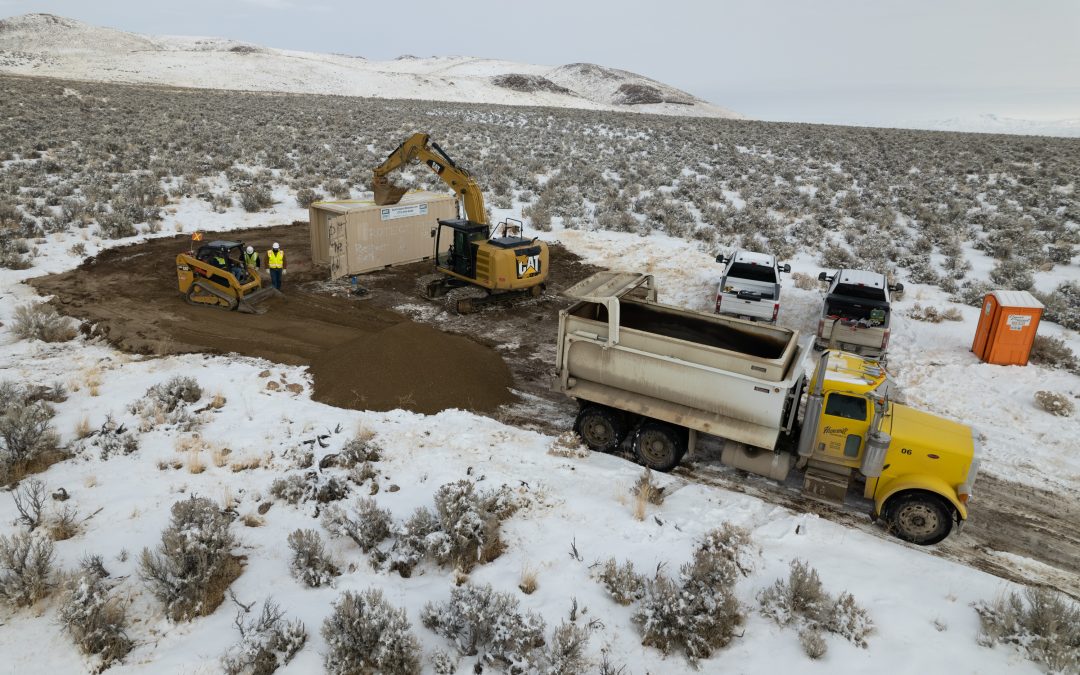
![Legal update and hearing this week / Press Conference on Thacker Pass Lawsuits [Dispatches from Thacker Pass]](https://dgrnewsservice.org/wp-content/uploads/sites/18/2021/08/Rally-at-Far-Western-980x549-1.jpg)